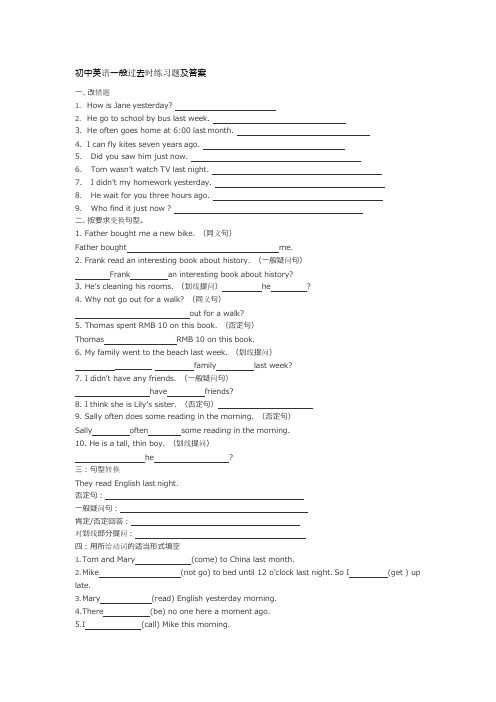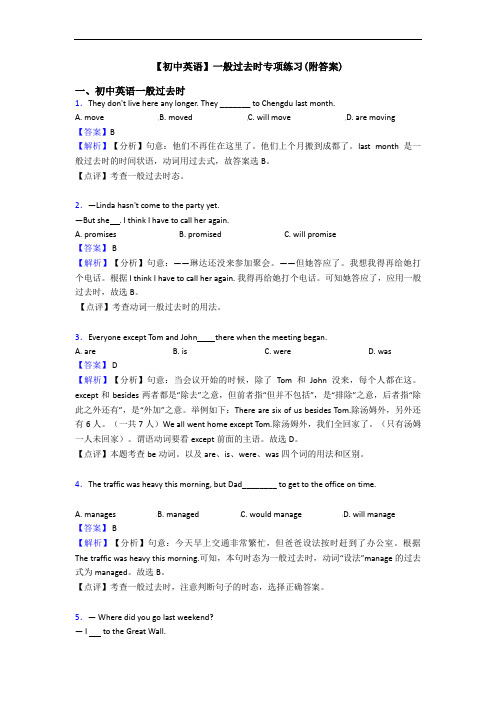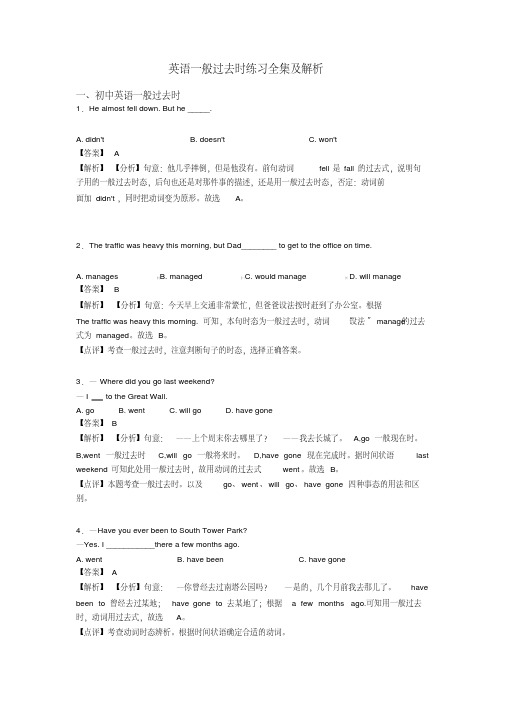初中英语一般过去时及练习
(英语)英语一般过去时技巧(很有用)及练习题

(英语)英语一般过去时技巧(很有用)及练习题一、初中英语一般过去时1.By the time I ________ on the TV, Beckham ________ two goals.A. turned; have scoredB. turned; had scoredC. had turned; have scoredD. had turned; had scored【答案】 B【解析】【分析】句意:当我打开电视的时候,贝克汉姆已经进了两个球。
本句是时间状语从句,by the time到…时候为止,用于一般过去时,可排除CD选项。
从句用一般过去时,主句用过去完成时,需用“had+过去分词”结构,可排除A;根据句意结构,可知,故选B。
【点评】考查动词时态辨析题。
2.Everyone except Tom and John there when the meeting began.A. areB. isC. wereD. was 【答案】 D【解析】【分析】句意:当会议开始的时候,除了Tom和John没来,每个人都在这。
except和besides两者都是“除去”之意,但前者指“但并不包括”,是“排除”之意,后者指“除此之外还有”,是“外加”之意。
举例如下:There are six of us besides Tom.除汤姆外,另外还有6人。
(一共7人)We all went home except Tom.除汤姆外,我们全回家了。
(只有汤姆一人未回家)。
谓语动词要看except前面的主语。
故选D。
【点评】本题考查be动词。
以及are、is、were、was四个词的用法和区别。
3.Mark Zuckerberg, founder of Facebook, _____ _________to donate a lot of money to charity when his daughter was born.A. decidesB. has decidedC. had decidedD. decided 【答案】 D【解析】【分析】句意:当脸书的创始人——马克·扎克伯格的女儿出生的时候,他决定把很多钱捐给慈善事业。
(完整版)初中英语一般过去时练习题及答案

初中英语一般过去时练习题及答案一、改错题1.How is Jane yesterday?2.He go to school by bus last week.3.He often goes home at 6:00 last month.4.I can fly kites seven years ago.5.Did you saw him just now.6.Tom wasn’t watch TV last night.7.I didn’t my homework yesterday.8.He wait for you three hours ago.9.Who find it just now ?二、按要求变换句型。
1.Father bought me a new bike. (同义句)Father bought me.2.Frank read an interesting book about history. (一般疑问句)Frank an interesting book about history?3.He’s cleaning his rooms. (划线提问)he ?4.Why not go out for a walk? (同义句)out for a walk?5.Thomas spent RMB 10 on this book. (否定句)Thomas RMB 10 on this book.6.My family went to the beach last week. (划线提问)family last week?7.I didn’t have any friends. (一般疑问句)have friends?8.I think she is Lily’s sister. (否定句)9.Sally often does some reading in the morning. (否定句)Sally often some reading in the morning.10.He is a tall, thin boy. (划线提问)he ?三:句型转换They read English last night.否定句:一般疑问句:肯定/否定回答:对划线部分提问:四:用所给动词的适当形式填空1.Tom and Mary (come) to China last month.2.Mike (not go) to bed until 12 o’clock last night.So I (get ) up late.3.Mary (read) English yesterday morning.4.There (be) no one here a moment ago.5.I (call) Mike this morning.6.I listened but (hear) nothing.7.Tom (begin) to learn Chinese last year.st week we (pick) many apples on the farm.9.My mother (not do) housework yesterday.10.She watches TV every evening. But she (not watch) TV last night.习题答案:一:1.is--was 2.go--went 3.goes--went 4.can--could 5.saw--see 6.watch--watching 7.didn't 后加上 do8.waited 9.find--found二: 1.a new bike to 2.did read 3.What's doing 4.Why don't you 5.didn't spend 6.Where were my going7.Did I any 8.I don't think she is Lily's sister. 9.doesn't do 10.How does look like8.They didn't read English last night.三:Did they read English last night?Yes,they did./No,they didn't.What did they do last night?四、1.came2. didn’t go got3. read4. was5. called6.heard7.began8.picked9.didn’t do10.didn’t watch11.your father ( go ) to work every day last year?12.—What time you (get) to Beijing yesterday?—We (get) to Beijing at 9:00 in the evening.13.What (make) him cry (哭) just now?st year the teacher (tell) us that the earth moves around the sun.15.There a telephone call for you just now. (be)16.There not enough people to pick apples that day. ( be)17.There any hospitals (医院) in my hometown (家乡) in 1940. ( be not)18.There enough milk at home last week, wasn’t there?19.Eli to Japan last week. ( move)20.–When you (come) to China? - Last year.21.Did she (have) supper at home?22.Jack (not clean) the room just now.23. (be) it cold in your city yesterday?24.How many people (be) there in your class last term?25.It (be) hot yesterday and most children (be) outside.26.There (be) a football match on TV yesterday evening, but I (have) no time to watch it.27.He ate some bread and (drink) some milk.28.he (finish) his homework last night?29.I (be) tired yesterday.30.I (gain ) Arts degree last year.答案:11. Did go 12.did get got 13. made 14. told 15.was 16. were 17.weren’t 18.was 19.moved 20.did come21.have 22.didn’t clean 23.Was 24.were 25.was were 26.was had27.drank 28.Did finish 29.was 30.gained。
初中英语语法一般过去时专项讲解及练习

初中英语语法一般过去时专项讲解及练习一般过去时是英语中常用的时态之一,用来表示发生在过去某个具体时间的动作或状态。
以下是一般过去时的用法及一些练题。
一般过去时的用法1. 表示过去某个具体时间发生的动作或状态。
- I played football yesterday.(我昨天踢了足球。
)- She was a teacher two years ago.(两年前她是一名老师。
)2. 表示过去经常性、惯性的动作或状态。
- We always went swimming in the summer.(我们夏天经常去游泳。
)- He used to live in the countryside.(他过去住在乡下。
)3. 表示过去的客观事实或真理。
- The sun rose in the east.(太阳从东方升起。
)- She knew the answer.(她知道答案。
)一般过去时练题请根据句子的意思,在括号中填上适当的动词的过去式。
1. My friend __________ (visit) me last week.(我朋友上个星期来看我。
)2. They __________ (watch) a movie yesterday evening.(他们昨晚看了一部电影。
)3. Helen and I __________ (play) tennis together when we were children.(海伦和我小时候一起打网球。
)4. He __________ (not go) to school yesterday because he was sick.(他昨天因为生病没去上学。
)5. We __________ (live) in that house for five years before we moved.(我们在那个房子住了五年才搬走。
)总结一般过去时用于表示过去某个具体时间发生的动作或状态,过去的经常性、习惯性动作或状态,以及客观事实或真理。
(英语)中考英语一般过去时真题汇编(含答案)精选全文

精选全文完整版(可编辑修改)(英语)中考英语一般过去时真题汇编(含答案)一、初中英语一般过去时1.He___________ his grandparents in the countryside last week.A. visitsB. visitC. visited【答案】C【解析】【分析】句意:上周,他拜访了在农村的祖父母。
A. visits 单数第三人称形式; B. visit 动词原形;C. visited一般过去式。
因为句中有一般过去式的标志性短语:last week.,故答案选C。
【点评】考查动词的时态,注意句中的时间状语。
2.—Sorry, I your dictionary yesterday.—It doesn't matter.A. took; by handB. took; by mistakeC. got; by accidentD. brought; in this way【答案】 B【解析】【分析】句意:——抱歉,昨天我由于差错拿走了你的字典。
——没关系。
yesterday昨天,和一般过去时连用,take:带走,bring:带来,get:得到,by mistake:由于差错,by hand:手工,in this way:以这种方式,根据句意可知答案,故选B。
【点评】考查动词的时态,辨析和短语。
根据语境判断句意,选出恰当的选项。
3.Yao Ming, a basketball giant, ___________ water polo when he was young.A. is playingB. used to playC. is used to playingD. was playing【答案】 B【解析】【分析】句意:姚明,一个篮球天才,当他年轻时经常玩水球运动。
根据when he was young,可知句式时态是一般过去时,used to do sth.过去经常做某事;be used to doing,习惯做某事,故选B。
【初中英语】一般过去时专项练习(附答案)

【初中英语】一般过去时专项练习(附答案)一、初中英语一般过去时1.They don't live here any longer. They _______ to Chengdu last month.A. moveB. movedC. will moveD. are moving【答案】B【解析】【分析】句意:他们不再住在这里了。
他们上个月搬到成都了。
last month是一般过去时的时间状语,动词用过去式,故答案选B。
【点评】考查一般过去时态。
2.—Linda hasn't come to the party yet.—But she . I think I have to call her again.A. promisesB. promisedC. will promise【答案】 B【解析】【分析】句意:——琳达还没来参加聚会。
——但她答应了。
我想我得再给她打个电话。
根据 I think I have to call her again. 我得再给她打个电话。
可知她答应了,应用一般过去时,故选B。
【点评】考查动词一般过去时的用法。
3.Everyone except Tom and John there when the meeting began.A. areB. isC. wereD. was【答案】 D【解析】【分析】句意:当会议开始的时候,除了Tom和John没来,每个人都在这。
except和besides两者都是“除去”之意,但前者指“但并不包括”,是“排除”之意,后者指“除此之外还有”,是“外加”之意。
举例如下:There are six of us besides Tom.除汤姆外,另外还有6人。
(一共7人)We all went home except Tom.除汤姆外,我们全回家了。
(只有汤姆一人未回家)。
谓语动词要看except前面的主语。
故选D。
【点评】本题考查be动词。
英语一般过去时练习全集及解析

英语一般过去时练习全集及解析一、初中英语一般过去时1.He almost fell down. But he _____.A. didn'tB. doesn'tC. won't【答案】 A【解析】【分析】句意:他几乎摔倒,但是他没有。
前句动词fell是fall的过去式,说明句子用的一般过去时态,后句也还是对那件事的描述,还是用一般过去时态,否定:动词前面加didn't,同时把动词变为原形。
故选A。
2.The traffic was heavy this morning, but Dad________ to get to the office on time.A. managesB. managedC. would manageD. will manage【答案】 B【解析】【分析】句意:今天早上交通非常繁忙,但爸爸设法按时赶到了办公室。
根据The traffic was heavy this morning.可知,本句时态为一般过去时,动词“设法”manage的过去式为managed。
故选B。
【点评】考查一般过去时,注意判断句子的时态,选择正确答案。
3.— Where did you go last weekend?— I to the Great Wall.A. goB. wentC. will goD. have gone【答案】B【解析】【分析】句意:——上个周末你去哪里了?——我去长城了。
A,go一般现在时。
B,went一般过去时C,will go一般将来时。
D,have gone现在完成时。
据时间状语last weekend可知此处用一般过去时,故用动词的过去式went。
故选B。
【点评】本题考查一般过去时。
以及go、went、will go、have gone四种事态的用法和区别。
4.—Have you ever been to South Tower Park?—Yes. I ___________there a few months ago.A. wentB. have beenC. have gone【答案】A【解析】【分析】句意:—你曾经去过南塔公园吗?—是的,几个月前我去那儿了。
英语英语一般过去时练习题及答案及解析

(英语)英语一般过去时练习题及答案及解析一、初中英语一般过去时1.- Have you finished your homework?-Yes, I have. I it this morning.A. finishB. finishesC. finishedD. have finished【答案】 C【解析】【解析】句意:你完成你的作业了吗?——是的,我完成了。
我今日清晨完成的。
联合语境可知下文描述的是过去某时发生的动作,故用一般过去时态。
选 C。
【谈论】英语中的时态主假如借助于时间状语与上下文语境来进行判断。
解答此类题型,第一要注意句子中的时间状语,假如没有则要经过解析上下文,联合语境来判断句子的时态。
英语疑问句中一般拥有时态上的对应关系,注意联合这一特色进行划分。
2.—My car ________ yesterday. Could you please give me a ride tomorrow?—I'm sorry I can't, I'm ________ Dalian tomorrow morning.A. breaks down; flying atB. has broken down; flying atC. broke down; flying toD. had broken down; flying to【答案】C【解析】【解析】句意:——我的车坏了,你明日能搭我一程吗?——对不起我不可以,我明日清晨要坐飞机去大连。
break down ,出弊端,出故障,依据yesterday,可知用一般过去时, break 的过去式是 broke,依据 tomorrow morning ,可知用一般未来时,一些表示挪动的动词可以用 be+doing ,表未来时,应选 C。
【谈论】观察动词的时态。
注意依据时间状语确立动词时态。
3.Everyone except Tom and John A. are B. is there when the meeting began.C. wereD. was【答案】D【解析】【解析】句意:当会议开始的时候,除了Tom 和 John 没来,每一个人都在这。
【英语】中考英语一般过去时题20套(带答案)及解析

【英语】中考英语一般过去时题20套(带答案)及解析一、初中英语一般过去时1.Bella, a young singer, ______ on January, 2015 because of cancer. Her death made us very sad.A. has been deadB. has diedC. was deadD. died【答案】 D【解析】【分析】句意:贝拉,一位年轻的歌手在2015年的1月因为癌症去世了。
她的死叫我们很难过。
根据时间on January, 2015可知用过去式,结合句意和语境应选D。
2.Everyone except Tom and John there when the meeting began.A. areB. isC. wereD. was【答案】 D【解析】【分析】句意:当会议开始的时候,除了Tom和John没来,每个人都在这。
except和besides两者都是“除去”之意,但前者指“但并不包括”,是“排除”之意,后者指“除此之外还有”,是“外加”之意。
举例如下:There are six of us besides Tom.除汤姆外,另外还有6人。
(一共7人)We all went home except Tom.除汤姆外,我们全回家了。
(只有汤姆一人未回家)。
谓语动词要看except前面的主语。
故选D。
【点评】本题考查be动词。
以及are、is、were、was四个词的用法和区别。
3.The traffic was heavy this morning, but Dad________ to get to the office on time.A. managesB. managedC. would manageD. will manage【答案】 B【解析】【分析】句意:今天早上交通非常繁忙,但爸爸设法按时赶到了办公室。
根据The traffic was heavy this morning.可知,本句时态为一般过去时,动词“设法”manage的过去式为managed。
- 1、下载文档前请自行甄别文档内容的完整性,平台不提供额外的编辑、内容补充、找答案等附加服务。
- 2、"仅部分预览"的文档,不可在线预览部分如存在完整性等问题,可反馈申请退款(可完整预览的文档不适用该条件!)。
- 3、如文档侵犯您的权益,请联系客服反馈,我们会尽快为您处理(人工客服工作时间:9:00-18:30)。
一、句型转换
1. The children had a good time in the park.
否定句:__________________________________________
一般疑问句:________________________________________
对划线部分提问:____________________________________
2. There were about nine hundred people at the concert.
否定句:__________________________________________
一般疑问句:________________________________________
对划线部分提问:____________________________________
3. Ann did her homework yesterday evening.
否定句:__________________________________________
一般疑问句:________________________________________
对划线部分提问:____________________________________
4. Last week I read an English book.
否定句:__________________________________________
一般疑问句:________________________________________
肯定/否定回答:____________________________________
对划线部分提问:____________________________________
5. My brother was in the park just now.
否定句:__________________________________________
一般疑问句:________________________________________
对划线部分提问:____________________________________
二、写出下列动词的第三人称单数形式、过去式形式
go _______ _______ enjoy _______ _______buy _______ _______ eat _______ _______ get _______ _______ walk _______ _______take _______ _______ dance _______ _______ write _______ _______ run _______ _______swim _______ _______ find _______ _______ begin _______ _______ eat _______ _______play _______ _______ study _______ _______
三、用所给词的适当形式填空。
1. Tom and Mary ___________ (come) to China last month.
2. Mike _________________(not go) to bed until 12 o'clock last night.
So he ______ (get) up late.
3. Mary __________ (read) English yesterday morning.
4. Tom ___________ (begin) to learn Chinese last year.
5. My mother ________________ (not do) housework yesterday.
6. There ____________ a telephone call for you just now. (be)
7. -When _______ you _________ (come) to china?-Last year.
8. _________ (be) it cold in your city yesterday?
9. How many people ________ (be) there in your class last term?
10. There ________ (be) a football match on TV yesterday evening, but I _________ (have) no time to watch it.
四、改错题(请改正每个句子中的一个错误)
1.How is Jane yesterday? _________________________________________
2.He go to school by bus last week. ________________________________
3.He goes home at 6:00 last month. ________________________________
4.I can fly kites seven years ago. ___________________________________
5.Did you saw him just now. _______________________________________
6.Tom wasn't watch TV last night. ________________________________
7.I did not my homework yesterday. _______________________________
8.He wait for you three hours ago. _________________________________
9.Who find it just now? ____________________________________________
II. 翻译下列句子
1. 我过了一个忙碌但却刺激的周末。
_________ _________ __________ __________but exciting weekend.
2. 上周六他们做什么了?他们做作业和购物了。
What ________ they _________ _________ Saturday?
They _________ __________ homework and _________ ________ __________.
3. 今天早上方方得做饭,因为昨晚他父亲不在家。
This morning Fangfang _______ _______ _______ _______ because his father _______
________ ________ yesterday.
4. 他在打扫教室的时候,发现地上有块表。
When he ______ the classroom, he ______ a watch on the ground.
5. 他什么时候出生的?1980年。
---When _______ he _______ ---_______ 1980.。
